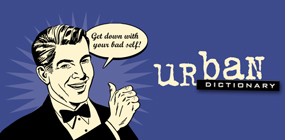Urban Dictionary defines slang for some court cases, but is it accurate?

Image from Urban Dictionary’s Google app.
Confronted with unfamiliar words that aren’t defined either by Webster’s or Black’s dictionaries, some lawyers and judges are turning to a street-slang resource, the Urban Dictionary.
It has been used by courts to define terms including “iron” (a handgun), “catfishing” (Internet predators using fabricated identities) and “dap” (the fist-bump alternative to a traditional handshake). But just because the online definitions have popular support, such crowdsourcing can be a recipe for inaccuracy, experts tell the New York Times (reg. req.).
Using definitions developed by popular consensus to define words in court cases “is a terrible idea; they don’t claim to be an authority or a reference,” says senior editor Tom Dazell of the New Partridge Dictionary of Slang and Unconventional English. While he himself is a fan of Urban Dictionary, “there is more chaff than wheat,” he contends, calling it “a lazy person’s resource.”
Definitions, regardless of how respected the resource, can also pose a problem if the person using the terminology meant to say something different than what is conveyed to readers, the newspaper notes. Several years ago, the Nevada Supreme Court said the state’s department of motor vehicles had to issue the vanity plate “HOE.” Although some saw the word differently, motorist William Junge, 62, had picked the term because TAHOE, in honor of his Chevrolet Tahoe, had already been taken.
“That was their interpretation,” he told reporters, referring to the state department of motor vehicles, at the time of the 2009 ruling. “Shame on them.”



